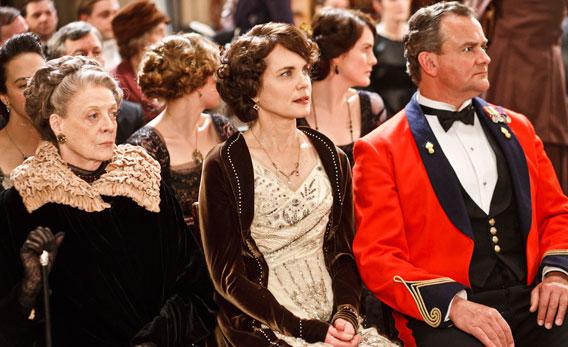Fellow Abbey-heads,
Dan, you’re right about Revenge. And it’s been pointed out to me that Gossip Girl also soapily limns the travails of wealthy families. (What’s more, both shows delve into class conflict—be it the bar-owning, blue collar brothers in Revenge, or the harsh privations Dan and Jenny Humphries suffer from growing up in an enormous Dumbo loft instead of an Upper East Side townhouse.)
Yes, yes, Bates is a good man. But couldn’t he sidestep a whole lot of agita if he’d just explain himself once in a while? He almost seems to enjoy the martyr role. He could have easily spared Anna and Lord Grantham so much distress if he’d given them maybe not the entire story, but at least a hint as to why he’s acting like such a weirdo.
As for the other “good men” at Downton: I agree that Matthew is a soulful, menschy dude, deserving of our respect. But Lord Grantham? I’m not so sure. He showed some admirable traits in his willingness to employ, and wait out the learning curve of, Bates. But must we credit him for the smarmy manner in which he justifies the perpetuation of the ruling class? Need I remind you that he married Cora for money, not love? And what a whiny child he’s been about his military appointment, all puffed up in his scarlet uniform and his epaulettes. I’m watching you, Lord Grantham—I see the messy ego beneath the tolerant, patrician façade.
Lady Edith’s complaint about her dress—as Carson seemingly wobbled on the precipice of death a few feet away—is the kind of ridiculous, villainous behavior that Downton does so well. Few shades of gray here. The show lets us know exactly how we should feel about its characters. Oh, it will let us sympathize with Edith for a moment, watching her at last find a modicum of joy behind the wheel of a tractor. But soon enough it ham-handedly reminds us that it’s our sworn duty to root against her.
We know Carson carries no torch for his previous life as a man of the theater. But you’re right, Dan. Surely there are regrets hiding within him. A man who could feel so tenderly toward Mary must have love to give—beyond his love of a well-served dinner and gleamingly polished wainscoting.
What do we think of the war scenes? I can feel the strain on ITV’s budget as it attempts to depict World War I battles entirely from the confines of a few feet of trench. But have they successfully thrown life at Downton into contrast? Matthew says to Thomas that war has a way of making it clear what’s really important. Yet I don’t get the sense that the show really wants us to discount the weightiness of the Crawley family’s romantic and financial vicissitudes. To paraphrase and invert Bogey’s line from Casablanca: Perhaps the problems of some soldiers in a trench don’t amount to a hill of beans in this crazy, aristocratic world?
But what about MY dress??,
Seth
